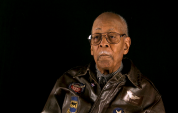10:35 | Alexander Jefferson had flown nearly every day since he arrived in Europe. The casualty rate among airmen was statistically very high, and the P-51 he flew didn't have the survival functionality we might expect on an aircraft today. So when he was shot down after his 18th mission, it was a miracle he survived, but what came after would be equally worrying.
Keywords : Toulon France Radar Station Target Shot down bail out Frankfurt Germany Geneva Convention Interrogation Robert Daniels Stalag Luft III

Alexander Jefferson is a Detroit native with a very notable lineage. Like many in his family, he’d attend Clark College in Atlanta, but when the attack on Pearl Harbor occurred he answered the call and found himself on the path to be trained as a pilot, something that had never been offered to black men in the military before.
A new program was set up to train black men to fly, and Alexander Jefferson, having some college education, was one of the early participants. As black men, they were already under a lot of scrutiny, but he describes how their instructors helped push them through the difficult training.
As the U.S. continued operations in Europe, Alexander Jefferson would graduate from his flight training and make way for an airbase in Ramitelli Italy. It was from there he would get his first taste of combat, flying as a member of the Tuskegee Airmen.
The mission of the Red Tails was to protect the Air Corps' bombers as they struck vital targets across Europe. Alexander Jefferson recalls one such mission over Ploesti where the incoming flak took down one of their B-17s.
Alexander Jefferson recalls his captivity in Stalag Luft III, camp southeast of Berlin. The war was far from over so the Germans were on edge about potential sabotage of their camp, but Alexander recalls his own interesting treatment there.
There aren't a lot of perks to being the captive of the German Army, and as the Allied powers made their way closer to Berlin, the prisoners would need to be relocated during the harsh winter. Alexander Jefferson describes the journey to Stalag 7A and his life as a prisoner.
After 9 months a prisoner, Alexander Jefferson was liberated, the war was over, and he was on his way home. In spite of all that he and the other Tuskegee Airmen accomplished, the U.S. was still unwelcoming. He describes the years following the war, and the lasting impact the Tuskegee Airmen had on not only the military, but the country.